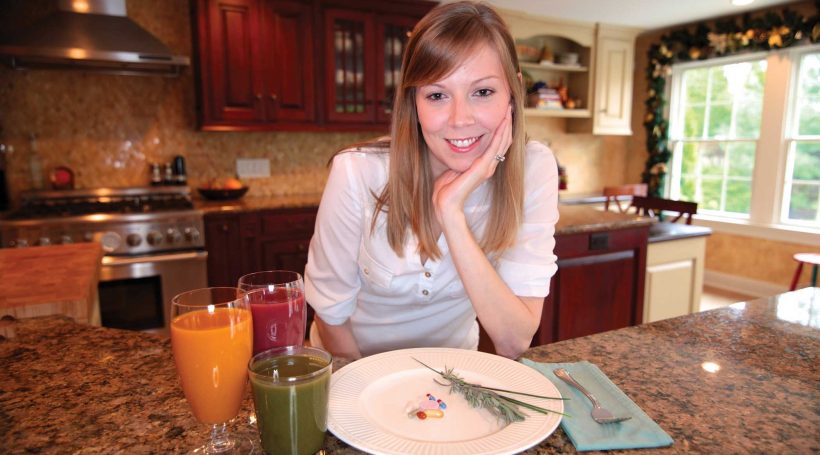Caitlin Latko had been struggling to eat healthfully.
While expecting her baby last year, “I couldn’t stomach cooked vegetables,” says the Merchantville woman. Then, after her daughter’s September birth, Latko lacked the time to prepare nutritious meals.
“It was hard to find time to eat anything,” recalls the 28-year-old. “Then it was the holidays…”
That chain of events led to an unhealthy, frustrating spiral for the working mom – so she turned to a “cleanse” diet to get herself back on track.
Latko has plenty of company. Cleanse or “detox” diets are very popular, says Jaclyn Bennett, RD, a clinical dietitian for Virtua Voorhees Hospital. “I’m always asked about it.”
Indeed, a Google search for “detox diet” yields more than 18 million results – everything from Dr. Oz’s 48-hour weekend cleanse to Gwyneth Paltrow’s seven-day elimination diet.
But do these regimens really work, and are they healthy or even safe? Experts give mixed reviews.
Defining detox
For starters, there’s no real definition of a detox or cleanse diet, notes Lisa Medvetz, MD, director of bariatric and metabolic surgery at Lourdes Medical Center of Burlington County. “It’s whatever someone decides to call it.”
In theory, though, “detox diets are intended to release accumulated toxins and waste products from the body,” notes dietitian Bennett.
The plans can vary from a one-day fast, to five days of juices, to three-week detox programs, says Bennett, and they may include herbs and supplements. So-called “colon cleansing” diets often contain laxatives or call for enemas to help empty the intestines. “The concept is, giving the gastrointestinal tract rest allows the cells to rebuild. By avoiding toxins, they can become stronger and healthier.”
However, such claims are not scientifically proven. “There is no research that supports the efficacy of detox diets and cleanses,” emphasizes Bennett.
In fact, the body purifies itself. “The spleen, the lymphatic system, the liver – they clean your blood and eliminate toxins in your body,” explains surgeon Medvetz. “There are waste products in the stool [and urine] as well. ‘Detox’ is just a buzz word to get people to spend money.”
Marketing messages
As the word “diet” implies, most detox and cleanse regimens are meant to promote weight loss. Many also promise more energy, better health, improved complexion and enhanced digestion, says Bennett.
While none of these claims is backed by research, short detox diets can help some people lose a small amount of weight – although the loss is usually temporary, doctors say.
Caitlin Latko felt she had more energy during her juice cleanse. Though she wasn’t looking to lose weight, she did shed a few pounds.
Consumers should keep in mind, companies spend big bucks promoting these diets and the messages are highly persuasive. “The diet industry represents billions of dollars,” says Lourdes’ Medvetz, who refers to detox diets as a “scam.”
“They’re so enticing, even I want to get sucked in! The marketing is unbelievable.”
Women can be especially vulnerable to these promises, which are aimed more at females, Medvetz says. “For women, the ideal of beauty is still the Barbie standard. Women’s images are manipulated in the media, which makes normal women feel bad about themselves.”
Virtua’s Bennett believes the cleanse fad also appeals to men. “Everyone is looking for that quick weight-loss fix.”
Costs of the diets vary. Those featuring premade shakes or juices are more expensive than foods you prepare at home. Latko, for instance, paid $235 for a shipment of 18 bottled drinks, which she consumed over her diet’s three days. Despite the price tag, she chose premade drinks for convenience and to help ensure she stuck with the diet.
Medvetz recalls one patient who spent $500 for a 10-day cleanse. “The worst thing I see is that people get very disappointed and down on themselves when the diet doesn’t work, and they gain the weight back. They come in the office and they’re crying,” says the weight-loss surgeon.
Safety concerns
Because anything can be labeled a detox or cleanse diet, consumers should evaluate each on its own merits. Many detox diets provide too few calories, protein and fat, and can be unsafe when done for too long, says Bennett.
Plus, some include powders or pills that could contain unknown ingredients, Medvetz notes. “It’s very scary – how do you know what’s in them?”
Even a weight-loss diet should contain at least 1,200 calories a day, or 1,600 calories for a tall man, according to Bennett. (Calorie needs vary for each person, depending on size, gender and activity level.) Eating too few calories can cause an array of problems, says Bennett, who’s seen diets with as few as 600 daily calories.
When calorie intake drops too low, Medvetz explains, the body conserves energy (calories) to avoid starvation. That slows weight loss. Moreover, the body will start breaking down muscle tissue in order to get the energy it needs.
Extended cleanses, in particular, “can cause muscle wasting and put the body into starvation mode,” says Bennett. “Long-term, they can cause nutrient deficiencies, which can cause loss of energy and affect concentration.” People with health problems – including undiagnosed diabetes or kidney disease – face even greater risks.
Bennett warns about the well-known Master Cleanse, in particular. “It’s very unhealthy – don’t do it!” she cautions, listing the diet’s sole ingredients: lemon juice, maple syrup, cayenne pepper and water. “It can cause dehydration, muscle wasting, low blood pressure.” She also advises against diets that include the herb senna, which is a laxative that can be habit-forming.
A severely limited diet is self-defeating in other ways, too. “You’ll probably be hungry the whole time you’re on it,” says Bennett. “Then when you go off it, you might overindulge because you’ve been depriving your body of calories and nutrition.”
Latko “didn’t want to do something restrictive,” so she chose a three-day plan consisting of six different juice combinations for a total of about 1,200 daily calories. The drinks contained cashews, which provided some protein and fat, in addition to the juices’ carbohydrates.
Although Bennett recommends against detox diets, she says the safest ones are like Latko’s – lasting just two or three days and containing all the necessary food groups: protein, fat and carbs. Still, she advises people to check with their doctor first.
Potential benefits
On the plus side, detox diets can make you feel good. “You get a sense of satisfaction that you have enough discipline to do these diets,” says Bennett. And the regimens can put you in the right mindset to make other positive changes. “If you need a kick-start; if that’s your way of getting into a healthy eating lifestyle, that’s OK.”
Some claim that cleanse diets have helped them break addictions. “It’s mind over matter,” the dietitian explains. Since the plans typically ban coffee and alcohol, people may feel better once such substances have cleared the body – which takes about three days.
Latko can relate. “With a new baby, I was drinking a lot of coffee,” says the married public-relations executive. “By the afternoon of the diet’s third day, I had a lot of energy. I almost felt like I had caffeine.”
For Latko, the extra boost of motivation was key. Though still juggling a hectic schedule, “I pretty quickly went back to my healthy, pre-baby way of eating” after the diet, she reports. “Knowing I put money, time and energy into doing it was an incentive to take the time to eat right. I’m more mindful of it.”
Alternative advice
In general, Bennett and Medvetz both advocate a long-term approach to nutrition and weight loss.
“Eat a balanced diet with a variety of fruits, vegetables and wholes grains, incorporating all food groups,” advises Bennett. “Limit coffee, alcohol, smoking and other toxins.”
Medvetz recommends buying foods that are as close to their natural state as possible and avoiding processed items. “Have baked sweet potatoes instead of tater tots. Instead of buying chicken nuggets, buy chicken breasts or legs, or a rotisserie chicken.”
Cutting back on portion sizes is also a good idea, Medvetz says. Instead of using a dinner plate, “fill a dessert plate with fruits and vegetables on one half, a protein on one quarter and a carbohydrate on the other quarter. I’m not saying never have treats; everything in moderation.”
Physical activity is critical. “Walk more, play with your kids more, take the stairs,” suggests the doctor.
“In the long term,” says Medvetz, “we need to lean toward better mental and physical health to attain a healthy weight.”











